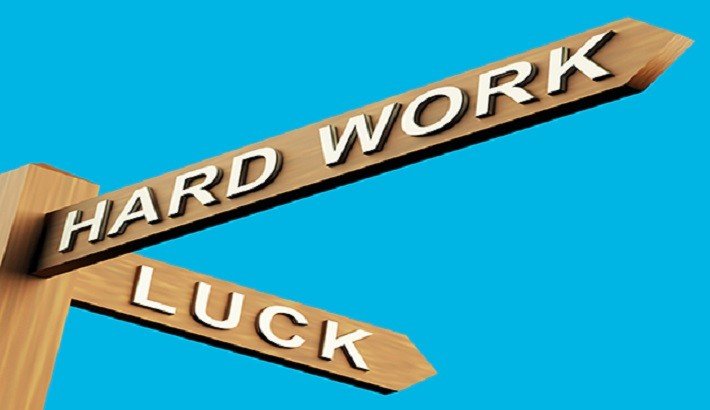In 1997, the legendary investor Warren Buffett posed a thought experiment that continues to resonate today. Imagine standing on the edge of existence, just 24 hours before your birth. A genie appears, granting you the extraordinary power to shape the rules of the society you’re about to enter—everything from its economic structure to its political system. But there’s a catch: you have no control over which identity you’ll assume. Rich or poor, male or female, healthy or ill, born in the United States or Afghanistan—your fate will be decided by a random draw from a barrel of 5.8 billion possibilities.
Buffett called this the “Ovarian Lottery.” It serves as a stark reminder that much of what determines our lives is beyond our control. He often acknowledges that pure chance—being born at the right place, at the right time—has been one of the greatest contributors to his own towering success. And yet, this acknowledgment of luck doesn’t tell the whole story.
The Power of Relentless Effort: The Story of Tu Youyou
To understand the complex interplay of luck and hard work, consider the remarkable journey of Tu Youyou, a Chinese scientist whose persistence changed the course of global health.
In 1969, during the Vietnam War, Tu was appointed to lead a covert Chinese research project known as Project 523. The mission: to develop a treatment for malaria, a disease that was killing as many soldiers as the war itself. Tu faced a daunting challenge. Modern medicine offered few solutions, and the stakes were high.
She and her team embarked on an exhaustive search, delving into centuries-old Chinese medical texts and scouring remote regions for potential medicinal plants. Over time, they collected over 600 plant species and identified nearly 2,000 possible treatments. Narrowing the field, they meticulously tested 380 compounds on lab mice, enduring countless failures and frustrations.
After years of exhaustive experimentation, a glimmer of hope emerged from an extract of the sweet wormwood plant, qinghao. However, initial success was inconsistent; the treatment worked only sporadically. Tu refused to give up. She revisited every source, re-read ancient texts, and finally discovered a critical clue: the extraction process was failing because the active ingredient degraded at high temperatures. By modifying the extraction method to use solvents with lower boiling points, Tu finally developed a treatment that was consistently effective.
But the obstacles didn’t end there. Human trials were needed, and due to the project’s secrecy, conventional clinical trials were impossible. Demonstrating extraordinary courage, Tu and two of her colleagues became the first human test subjects, infecting themselves with malaria to test the new treatment. It worked.
Despite this breakthrough, it would take nearly a decade before the world recognized her discovery. Political restrictions in China delayed the publication of her findings. Only in 2000 did the World Health Organization recommend artemisinin, the drug Tu developed, as a primary treatment for malaria. Today, it has saved millions of lives worldwide. Tu, who held no advanced degree, had never studied abroad, and was not a member of China’s national academies, became the first Chinese woman to win the Nobel Prize in Physiology or Medicine.
Her journey exemplifies the immense power of grit, resilience, and perseverance. She was not particularly “lucky” in conventional terms, but her hard work created the opportunity for her groundbreaking discovery.
Absolute vs. Relative Success
So, what ultimately determines success: luck or hard work? The answer depends on the lens through which you view it.
At the absolute level, luck reigns supreme. Factors like where you are born, your genetic inheritance, the time period you live in, and your early environment largely define your starting position in life. These elements are beyond anyone’s control. Buffett, Gates, and countless other billionaires benefited immensely from being born into circumstances that aligned perfectly with the opportunities of their time.
However, when we shift the focus to a relative perspective—comparing individuals with similar backgrounds, education, and opportunities—hard work emerges as the key differentiator. Among people who share comparable starting points, the most determined, disciplined, and diligent individuals tend to outperform their peers. Success in this context hinges on habits, choices, and sustained effort.
As Nassim Taleb aptly noted in Fooled by Randomness, “Mild success can be explainable by skills and labor. Wild success is attributable to variance.” In other words, extraordinary success almost always involves a large dose of luck, while moderate success is more readily explained by hard work.
The Slope of Success
Another helpful way to conceptualize this dynamic is through the idea of the “slope of success.” Imagine your life’s progress plotted on a graph: time on the X-axis, success on the Y-axis. The point at which you start—your initial Y-intercept—is largely determined by luck. But the slope, the rate of growth, is dictated by your choices, habits, and effort.
In his book Atomic Habits, James Clear writes, “It doesn’t matter how successful or unsuccessful you are right now. What matters is whether your habits are putting you on the path toward success.” Over time, a strong positive slope can overcome even a disadvantageous starting point, while a negative slope can squander even the most privileged beginning.
Of course, life isn’t always linear. Unforeseen tragedies or windfalls can disrupt even the best-laid plans. But broadly speaking, as time passes, the influence of hard work tends to compound, while the initial head start granted by luck diminishes.
Preparing for Luck
Although luck is inherently unpredictable, we can still position ourselves to benefit from it. As mathematician Richard Hamming observed, “The prepared mind sooner or later finds something important and does it.” Luck favors those who are ready to seize opportunities when they arise.
The golfer Gary Player famously quipped, “The harder I practice, the luckier I get.” The same principle applies across all fields of life. The more you put yourself out there—experimenting, learning, growing—the more likely you are to encounter a fortunate break. While we cannot command luck to appear, we can expand the surface area upon which it might land.
The Balance of Fate and Effort
In the end, success is not a simple story of luck versus hard work. It is a complex interplay of both forces. Luck often opens doors, but hard work determines whether you walk through them and what you do once inside. We cannot fully control the hand we are dealt, but we can play it to the best of our ability.
And when fortune does smile upon us, the greatest way to honor that gift is through relentless effort and steadfast commitment. As history has shown—from Warren Buffett’s reflections to Tu Youyou’s unwavering determination—those who combine opportunity with hard work are often the ones who leave the most lasting impact.





